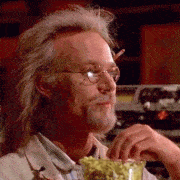|
Nessus posted:We do know that there are animals who seem to have some concept of counting, and in higher mammals and birds they seem to be able to naturally count to about seven or eight before losing track, from what I have read... and that is before considering that there are surely sentient beings comparable to humans in other areas of the universe. i dont think its even dependent on the question of sentience really. whether or not other beings are capable of counting doesn't really have much bearing on the fact that numbers are just concepts used in counting and do not really exist in and of themselves as things, they exist only as abstractions. you can have "two of something" and it's those somethings that exist, the "two" is just describing how many there are and "two" on its own is only an idea. i dont see how it makes a difference whether it's a human or a crow or an alien doing the counting.
|
|
|
|

|
| # ? Jun 3, 2024 15:46 |
|
White Coke posted:What has an essence, changeable or otherwise? quote:And if numbers donít exist without humans to ďcreateĒ them then what does? quote:Three of something is one more than two. This is a demonstration of emptiness. The qualities of three do not come from three itself but from its relationship to two. quote:Scientific laws describe natural phenomena to the best of our understanding but the underlying functions and relationships would continue without any humans to describe them, likewise with numbers. quote:Iíve brought it up previously, but if Buddhist teachings are empty then some, or all, of them could be outdated because the underlying principles observed and expounded upon have changed. quote:Perhaps now the path to enlightenment involves engaging in all sorts of horrifying conduct too monstrous to contemplate. What evidence is there that this is the case? Do you have evidence that I may achieve enlightenment through monstrous acts? If there is no evidence to support the assertion that impermanence has led to this state of affairs then we should continue to have faith that the Buddha was correct and that enlightenment is achieved through contemplation, patience, self-restraint, and love.
|
|
|
Earwicker posted:i dont think its even dependent on the question of sentience really. whether or not other beings are capable of counting doesn't really have much bearing on the fact that numbers are just concepts used in counting and do not really exist in and of themselves as things, they exist only as abstractions. BIG FLUFFY DOG posted:The qualities of three do not come from three itself but from its relationship to two.
|
|
|
|
|
Notahippie posted:It really seems like a pre-Christian story that was Christianized or otherwise a call back to pre-Christian beliefs because of that angle. But I think the Christian version leans into the idea that Satan or evil spirits were working against the church, and it was Oran's self-sacrifice for his faith that vanquished them. So less a question of a demand by God and more a martyrdom to conquer evil. Having said that, I don't think that Oran's story is seen as a mainstream or accepted story in the Irish church, I think it's more a local legend or side story attached to the story of St. Columba. My comment above was more a reflection on the idea that there is something of potential spiritual value in the story after all, when I had always seen it just as a ghost story with a church attached to it. There's actually a similar story about John the Apostle/Evangelist/Theologian/Revelator: OrthodoxWiki posted:"Account of the miracle that occurred at his grave: When over 100 years old, St. John took seven disciples outside of Ephesus and had them dig a grave in the shape of a cross. St. John then went into the grave, and the disciples buried him there, alive. Later on, when his grave was opened, St. John's body was not there. 'On May 8 of each year, dust rises up from his grave, by which the sick are healed of various diseases.'"
|
|
|
|
Keromaru5 posted:I'd heard a version of St. Oran's story, including his burial, from Fr. Seraphim Aldea, who's been working to re-establish an Orthodox monastery in the Hebrides. He did not include any part about reemerging to talk about the afterlife. It certainly goes way beyond anything Origen was ever condemned for. Bodily resurrection is well in line with Christian orthodoxy. They just jumped the gun a bit.
|
|
|
|
BIG FLUFFY DOG posted:Nothing exists independently of any other thing. Even a thing judged perfect could only be judged as such with an imperfect thing for comparison. Meanwhile, for Catholics, we disagree with that with the argument from contingency (Everything we're familiar with is contingent on some other thing, so where did they get their being from? Obviously God, the one non-contingent thing.) and the argument from gradation (Everything we're familiar with is better or worse in comparison to other things, so how do we know how to compare at all? Obviously God is the cause of all things' goodness.) - which is why I don't get how people think they can "harmonize" Catholicism (specifically) and Buddhism, because the... the fundamental metaphysics don't mesh. At least one of the two of us is wrong! It's tempting on the surface, though, because Teresa of Avila's prayer, "Teresa's Bookmark", for the first three lines, is entirely compatible with a everything-is-empty nothing-is-anything view! quote:Let nothing disturb you; quote:Nada te turbe;
|
|
|
|
BIG FLUFFY DOG posted:A number possess no essence. Numbers are a concept created by sentient beings for the purposes of counting. Without sentient beings to think of them they could not exist. They therefore come about through cause-and-effect and are interdependent, they will cease to exist should sentient beings cease to think about them and are therefore impermanent, the numbers themselves possess their meaning not by themselves but in relation to the other numbers as well as whatever it is we needed to count, they therefore have as their source all portions of existence which are not the number in question, they therefore have no essence. This is an interesting question. Whether numbers "really exist" in some Platonic sense independent of the physical world possibly has some theological significance, since among other things it would be an example of a truth not accessible by empirical methods. As a few examples, take the number 10^100. You only need middle school math to write it down, but it's already well beyond anything that can possibly be counted. There's (a lot) fewer subatomic particles in the universe than that number. Now if you work your way up to college math, it's easy to write down stupendously larger numbers like BB(1000), where BB is the busy beaver function. That number is so big that not only does it exceed anything that can be counted, it's not even possible to write down a finite computer program that could compute it - even in principle - given unlimited time and memory. It's even possible to show that there must in fact be numbers whose notation can't even fit into the physical universe in principle. Do those numbers exist? They certainly don't exist physically, but it seems more than a little odd to be forced into saying that some specific number is the end of the line because there's no specific living brain that can think about larger ones. Does the "+ 1" operation not work on that number, just because nobody's gray matter can deal with it at this particular moment? Kurt GŲdel was motivated by these kinds of thoughts when he was working on his incompleteness theorems. He was a Platonist, and irritated by the school of thought that said that math was a game played with symbols, not existing or having inherent meaning beyond those symbols. He proved that in any formal system that can represent the counting numbers, there are going to be theorems that really are true in that system but that can't be proved in that system. It's almost a meta-mathematical theorem - if you think that mathematical truth is something that only exists with respect to the game a thinking being is playing with formal symbols, then you can prove that that very game always carries the certain implication that there are actual truths beyond what you can make the symbols say. It's fascinating stuff. I'm not an expert, but I've long enjoyed learning about the philosophy of math.
|
|
|
zonohedron posted:Meanwhile, for Catholics, we disagree with that with the argument from contingency (Everything we're familiar with is contingent on some other thing, so where did they get their being from? Obviously God, the one non-contingent thing.) and the argument from gradation (Everything we're familiar with is better or worse in comparison to other things, so how do we know how to compare at all? Obviously God is the cause of all things' goodness.) - which is why I don't get how people think they can "harmonize" Catholicism (specifically) and Buddhism, because the... the fundamental metaphysics don't mesh. At least one of the two of us is wrong!
|
|
|
|
|
before things can be counted, unique and unknowable assemblages of subatomic wave functions must be arbitrarily categorized and defined as like and unlike. Sure, three apples vs two apples. But what's an apple?
|
|
|
|
shame on an IGA posted:before things can be counted, unique and unknowable assemblages of subatomic wave functions must be arbitrarily categorized and defined as like and unlike. Sure, three apples vs two apples. But what's an apple? look at this fool who doesnt know what an apple is
|
|
|
|
But numbers, or the concept of them would exist regardless of any items to be counted by virtue of their ratios to other numbers.
|
|
|
|
shame on an IGA posted:before things can be counted, unique and unknowable assemblages of subatomic wave functions must be arbitrarily categorized and defined as like and unlike. Sure, three apples vs two apples. But what's an apple? When I was unenlightened I saw an apple When I undertook the path I saw no apple When I became enlightened I saw an apple
|
|
|
|
Gaius Marius posted:But numbers, or the concept of them would exist regardless of any items to be counted by virtue of their ratios to other numbers. Quantities would exist. Numbers are a human conceit to better categorize objects. Zero, as a number, is a concept that was not solidified in western thought until well after the advent of engineering. Liquid Communism fucked around with this message at 03:36 on Oct 20, 2021 |
|
|
|
Nessus posted:I don't understand what you mean with the horrifying conduct. It can be disputed whether or not we can achieve enlightenment in the world as it stands, but the Pure Land schools basically say "It's impossible, so you should call on Amida to take you to the pure land for your next rebirth, and in that pure land you will be able to achieve liberation." But in terms of ethical requirements I think most schools of Buddhism are pretty consistent on: "try to follow the eightfold path; consider becoming a vegetarian or meditating or supporting a temple; keep at it, you'll get there." This does not seem monstrous to me, at least. By horrifying conduct I mean wanton acts of gratuitous violence. If everything is subject to change, then ethical requirements might become outdated. That said I know that some have found aspects of Buddhism disagreeable. Any advocate of pacifism is going to run up against the "so Hitler should have been allowed to win?" argument. I remember reading in college that when Buddhism was introduced to China there was opposition to it and one of the biggest complaints about it was that it advocated celibacy which could extinguish family lines. And there are those for whom detachment seems sociopathic since it strikes them as telling practitioners not to care about the suffering of others (this seems to come from a particularly misinformed understanding, though it still means they don't like Buddhism as they understand it). BIG FLUFFY DOG posted:This is correct and is the reason why simply reading Buddhist scripture is not sufficient for gaining knowledge of the dharma. The Buddha spoke to the people he met in ancient India for the purposes of solving the specific problems they faced in their lives. When you hear a Buddhist truth, you try it with skepticism, you examine it, contemplate it, and think about it in relation to your own experiences, perceptions, reason. You should then discuss it with Buddhists who are more advanced in the path then you. The absolute truth that the Buddha experienced in bodh Gaya is beyond words and dualistic language. In order to communicate it he developed conventional truths which will fail in certain circumstances but when adopted will lead you to experience this absolute truth for yourself. Every Buddhist truth must be held with an open hand. I have no evidence that it has or hasn't changed, but if everything is empty and subject to change then it will whether or not it already has. And if it has changed how would someone know? Does someone know they're enlightened or do they have to be told by others? If they need external validation then how do we trust the judges since they might have been incorrectly determined to be enlightened. Maybe they've been perpetuating mistaken beliefs and practices. Many religions have mystical traditions that seem similar to what Buddhists do, but they come different conclusions. If there is an absolute truth to work towards then they can't all be right. And it might be that the change in how one achieves salvation happened because it was superseded by a later religion like Christianity. One of the reasons for the Roman Emperor Diocletian's general persecution of Christians in the early fourth century was the Oracle of Delphi said the decreasing accuracy of her predictions was due to Christian influence. I don't know how one could try to prove it, but maybe the world worked differently before some other religion came along. Captain von Trapp posted:This is an interesting question. Whether numbers "really exist" in some Platonic sense independent of the physical world possibly has some theological significance, since among other things it would be an example of a truth not accessible by empirical methods. Yes. How would we access the Platonic realm if it exists? If it's heaven then visiting it isn't the issue so much as coming back. BIG FLUFFY DOG posted:When I was unenlightened I saw an apple I fear not the man who has eaten 10,000 apples once, but I fear the man who has eaten one apple 10,000 times.
|
|
|
|
Deteriorata posted:My take on it is that our personalities are constrained by being stuck in a body. The chemical imbalances in our brains limit how much our true selves can be expressed in this life. Dying liberates our personalities from those constraints and allows us to be and experience our true selves. I can go along with this; explains a lot about why people didn't always immediately recognize the resurrected Jesus.
|
|
|
|
White Coke posted:Does someone know they're enlightened or do they have to be told by others? It varies but in many traditions enlightenment must be confirmed by either a fully realized Buddha (which makes it impossible outside a pure land unless you live in a Buddhaís lifetime) or by your spiritual teacher. The zen monk Hakuin thought he had achieved enlightenment in his 20s only for his teacher to reject it before he became enlightened for real in his 40s. These teachers have genealogies of the teacher of the teacher of the teacher of the teacher etc which can in theory be traced all the way back to the Buddha so if youíre catholic their authority works along the same lines as apostolic succession. for your points that Buddhists canít be 100% certain that Buddhism is real, like yeah thatís literally all religions. Thatís why faith is a thing. You can never be certain of any metaphysical claim. You can however observe transformations in a persons morality or character as a result of their faith in that religion. If a person becomes more patient compassionate etc as the result of studying a religion than that religion is a worthwhile one for them. If they become more hateful, angry, fearful etc it probably isnít a good fit for them. For your points that some have disagreeable views about Buddhism and Buddhists. So? Thatís also all religions. The existence of anti-semitism does not make any points either way about what Jews believe or itís validity. Why should the prejudices of those who havenít followed the dharma and know little about it affect whether or not it is a worthwhile pursuit?
|
|
|
|
Depends on your tradition. Everyone I know who has taken the Bodhisattva vows is tested and there have been *right* answers and *wrong* answers to koans. I can only speak for Kwan Um (a form of Korean Zen/Seon that actively proselytizes in America). What you are saying is absolutely in keeping with the written tradition and what the more areligious "Buddhism-as-a-lifestyle" proselytizing traditions go for. I'm not particularly interested in religion as an intellectual exercise (though obviously that has its place) but more in religion as a living tradition. So, before going any further, I want to situate myself. I'm a cashew. And happily so, I see no contradiction because if I had to describe myself I would say that I am, "Religious but not spiritual." The traditions and cultural elements associated with religion are compelling to me. The broader gobbledegook is not. Internet fora are not a great venue for how I express myself. My intersection with Buddhism is primarily through romantic partners. Now, the Kwan Um partner -- their mom had a crazy midlife crisis and acrimoniously divorced their dad. That means a 50/50 split where 50% of that was at a Kwan Um temple because their mom took vows. My husband, on the other hand, is Vietnamese and has been getting "into" Buddhism. Reclaiming his culture and poo poo. I love him and I worry about him because I see him gravitating towards a tradition I can only really describe as "Protestant". Like, it is him and some text. That's a loving dire way to approach religion, in my opinion. But the alternative is also pretty dire. The viet community is not super accepting of homosexuality. So, I'm gonna pull the thread "agree to disagree" card. The Buddhism I know has answers. If you are a real Bodhisattva you come to those same answers too. I'll take some fries and a frostie.
|
|
|
White Coke posted:Many religions have mystical traditions that seem similar to what Buddhists do, but they come different conclusions. If there is an absolute truth to work towards then they can't all be right. And it might be that the change in how one achieves salvation happened because it was superseded by a later religion like Christianity. Most productive spiritual work that actually grows your moral and compassionate qualities will end up having a certain similarity because humans are humans and you're dealing with convergent evolution. There will often be similar fruits and realizations for pretty much the same reason, and these practices will likely produce the qualities that we would associate with a good, worthy, respectable religious figure. This doesn't mean that these people won't still be connected to their culture. Indeed they may be more deeply embedded in their culture's values than the average person, which can lead to supporting outrageous behavior and (distant, abstract) horrible acts, or excusing or overlooking the sins and crimes of others who are in their space. The ultimate goal of these exercises may also be very different... even if the exercises themselves are often in substantial alignment.
|
|
|
|
|
OnlyBans posted:I'm a cashew. Catholic + Jewish parents? I had an old friend who used that label which is the only instance I've come across it.
|
|
|
|
It's a type of nut, sort of C shaped. Top tier nut for sure. Behind peanuts
|
|
|
|
Fritz the Horse posted:Catholic + Jewish parents? I had an old friend who used that label which is the only instance I've come across it. Yes, there are a lot of us.
|
|
|
|
OnlyBans posted:Yes, there are a lot of us. I had a brief moment of "wait do I know you??" but there are tons of people what that background Anyhow welcome to the thread!
|
|
|
|
Liquid Communism posted:Quantities would exist. Zero as a number, or lack thereof wouldn't exist, but the concept of zero would exist regardless of human existence. To put it this way, the concept of relations between numbers would exist even in a universe without a single atom, or joule of energy.
|
|
|
|
Nessus posted:consider becoming a vegetarian i'm going to be a bad boy buddhist like ji gong or ikkyu. you can eat meat and drink alcohol as long as you act weird enough for people to think its part of the bit.
|
|
|
Gaius Marius posted:Zero as a number, or lack thereof wouldn't exist, but the concept of zero would exist regardless of human existence. To put it this way, the concept of relations between numbers would exist even in a universe without a single atom, or joule of energy. BIG FLUFFY DOG posted:i'm going to be a bad boy buddhist like ji gong or ikkyu. you can eat meat and drink alcohol as long as you act weird enough for people to think its part of the bit.  --the bodhisattva
|
|
|
|
|
BIG FLUFFY DOG posted:i'm going to be a bad boy buddhist like ji gong or ikkyu. you can eat meat and drink alcohol as long as you act weird enough for people to think its part of the bit. Phone posting on break so I canít respond to every post. I think the stumbling block of inter-faith discussion is that we come up to questions that canít be answered empirically, so they require participation in the religion and if someone does participate but comes away unconvinced then thereís the old stand by of saying they didnít really get it otherwise theyíd have been convinced. My questions about emptiness are because to me it seems like some rather contradictory claims are being made. Claims that have to be taken on faith when there are also claims being made about how the religion is rooted in experience. Iíve never experienced a scientific law changing such as gravity pushing things away, or light traveling half as fast and Iím not aware of anyone who ever has. So it all strikes me as being outside of the realm of my experience and in fact contrary to them. Thereís also the paradox of saying that everything changes. If thatís true then wouldnít the fact that everything changes itself change? Would there not be something eternal and immutable? Are there any Buddhist writings that address my confusion which you can direct me towards or is this something that could only be addressed by studying under someone? How much is deliberately breaking religious rules a thing in Buddhism? I know that other religions can have radically different ways to treat their behavioral commands between different denominations, but is this a case of rejecting proscribed behavior for oneís self but that it still holds for others, saying that other people got it wrong and now youíre doing it right and everyone should follow along, or as Iíve asking about previously a case where the rules have changed and everyone should change with them?
|
|
|
|
White Coke posted:Phone posting on break so I canít respond to every post. emptiness is part of the absolute truth and it is extremely difficult to understand. The ultimate reality in Buddhist thinking is non-dual, but logic and language are dualistic at their very core (if it is day it is not night). Large parts of absolute Buddhist doctrine are "anti-rational", trying to understand them through reason will always fail. They can be understood but that understanding comes to you in an epiphany after following the path. If you're looking for logic-proof buddhism you're not going to find it because that's not how the religion was designed by its founder. Now anti-rational beliefs shouldn't be that strange to Christian posters since the trinity is anti-rational or a "divine mystery" as the churches prefer to call it, with every attempt over the years to explain it logically or analogizing it to natural phenomena (such as the triple point of water) being denied as a heresy by the church. quote:How much is deliberately breaking religious rules a thing in Buddhism? I know that other religions can have radically different ways to treat their behavioral commands between different denominations, but is this a case of rejecting proscribed behavior for oneís self but that it still holds for others, saying that other people got it wrong and now youíre doing it right and everyone should follow along, or as Iíve asking about previously a case where the rules have changed and everyone should change with them? if you're a tibetan buddhist it's a whole loving thing. i cant explain the rituals because i'm not a tibetan buddhist and don't have a lama and they don't let people know about those rituals before their lama says they're ready because they're (justifiably) scared they'll just roll with it as divine permission to do whatever instead of deep insight into the truth BUT it's a whole loving thing. There's a tibetan buddhist poster in the buddhism thread who talks about that stuff quite a bit. for mahayana and theravidin? the one about rejecting it for their self but it still holding for others tbh. the monks i mentioned are well-known specifically because they broke the rules and during their lifetime they were both expelled from their monasteries and were a general topic of conversation and scandal with people coming around to them only later.
|
|
|
|
BIG FLUFFY DOG posted:
I haven't heard of that, is it based on something like the idea that while there are laws and rules that are designed to guide humans to fulfilling what's intended for us, too much focus on the rules or rituals as ends in themselves instead of means to an end can be counterproductive? I feel like there are echoes of that idea in Jesus' critique of the Pharisees, and the Tao te Ching states it explicitly. It makes sense to me that if you carried that forward, religious traditions could ask people to violate their own rules as a way of underscoring that the rules themselves aren't as important as the intent. It just seems like a super fraught idea and one that I can imagine would have to be handled very carefully so you don't end up with some of those weird Gnostic offshoots that just said "hey go hog wild on the sinning, here's a very thin justification for it"
|
|
|
|
Good luck to those Anabaptist missionaries in Haiti.
|
|
|
|
Nessus posted:Yeah? How so? Does this extend to all concepts, including ones that have not yet occurred to humans? Yeah, everything that exists or could possibly exists already does so. They just exist in a sorta higher plane than we can perceive, of course we do as well.
|
|
|
|
I was listening to Dave Chang's podcast, and he was talking about synthetic meat and brought up an interesting conundrum that's we're going to have to deal with. Should/is it permissible for people to eat synthetic meat? As in if your Muslim or Jewish can you eat a product that's chemically identical to pork, but did not involve the slaughter if a pig. I've been thinking about this for a minute when I was thinking if it was alright to eat the beyond meat during lent. I ended up mostly rolling with tempeh but it's been rolling around in the head for a minute. Any thoughts?
|
|
|
|
I think it presents a difficult challenge. If it's ultimately cloned muscle meat I suppose it's a different case than if it's a substitute or a synthetic. From my perspective, if it's a synthetic or a substitute then "right on." At most keep in mind that this is potentially a luxury good. It is somewhat complex if an animal was sacrificed as the origin of a cloned muscle meat farm, although I would think that the impact would be attenuated over the years... still probably not good for monks in those cases.
|
|
|
|
|
Gaius Marius posted:I was listening to Dave Chang's podcast, and he was talking about synthetic meat and brought up an interesting conundrum that's we're going to have to deal with. I guess it gets to the fundamental reasons as to why your religion forbids pork (or meat). If it's based on the meat itself, then a substitute would seem to be forbidden, too. If it's based on the animal it came from and the process that ended with it sitting on a plate, then the substitute would be fine. Theological rules-lawyering is as old as religion itself.
|
|
|
|
Nckdictator posted:Good luck to those Anabaptist missionaries in Haiti. I don't know for a fact that anyone among those who were kidnapped is anyone I know but I definitely have some connections in the part of Ohio where that mission group is based. Either way I'm sure they and their families would appreciate any prayers sent their way.
|
|
|
|
Oh I hadn't heard anything about that yet, but a couple Mennonite folks I'm acquainted with here (Michigan though) were going to Haiti, about a month ago I think. 😕
|
|
|
|
Gaius Marius posted:I was listening to Dave Chang's podcast, and he was talking about synthetic meat and brought up an interesting conundrum that's we're going to have to deal with. For lent, avoiding meat isn't about the animal or even the product itself, but rather about fasting and sacrifice. It's like, sure, a lobster dinner on a Lenten Friday technically meets the requirement, but it completely violates the spirit. So for Catholics at least, I would say that vat-steak is a no go during days of abstinence. On the other hand, vat-steak has the potential to be much more environmentally friendly, and if this ends up being the case then Catholics would in some sense be obligated to eat vat-steak instead of the real thing.
|
|
|
|
Can we give the vat pork split hooves and multiple stomachs? It's a weird thing for me since I don't believe in god or anything but just culturally don't eat pig out of my last bastion of stubbornly not assimilating, and I haven't been able to bring myself to eat fake pig either. So I probably wouldn't eat vat pork on balance. Halachically I suspect at least some rabbis would rule it out just in case, there is plenty of precedent for "don't do this thing because it resembles something we are explicitly forbidden" and this is basically exactly that.
|
|
|
|
according to the orthodox union it's technically kosher but not officially marked as kosherkashrut.com posted:"The largest and most influential certifier of kosher products in the world has declined to endorse Impossible Pork, even though nothing about its ingredients or preparation conflicts with Jewish dietary laws. https://www.kashrut.com/articles/ImpossiblePork/ also, i don't think it's "chemically identical" to pork also also, i have definitely seen turkey bacon that is certified kosher, so i don't think conceptually there is a problem with the idea of imitating a forbidden animal. kind of thought kosher hotdogs would fall into the same category too Earwicker fucked around with this message at 23:38 on Oct 22, 2021 |
|
|
|

|
|
|
|

|
| # ? Jun 3, 2024 15:46 |
|
I had an awful six-hour professional development training today, but one interesting thing that came up was this comparison of debate, discussion, and dialogue: https://depts.washington.edu/fammed/wp-content/uploads/2018/06/3d-HANDOUT.pdf imo this thread wants to avoid debate and when at all possible create an environment where dialogue is possible. This thread mostly involves discussion and dialogue under this framework. What's unique about this thread is it's one of very few places on the internet where we can actually have a dialogue on difficult religious issues. What should this thread be? Discussion and whenever possible dialogue about issues of religion and faith.
|
|
|





























